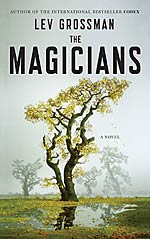
![]() SueCCCP
SueCCCP
1/1/2013
![]()
The Magicians shares many similarities with the Harry Potter books: a hidden magical world; a mix of pupils from magical families and those with ‘muggle’ parents, like Quentin; a unique magical game involving an outdoor arena and bizarre rules; the pupils go through a sorting process depending upon their talents. However, the tone of the book is entirely different from that of J.K. Rowling. Here magic is a mind-blowing boring pursuit with no apparent purpose. Unlike Hogwarts, which is obviously preparing its students for magical careers, Brakebills seems to serve no purpose other than the continuation of magical knowledge. Sure, we get to see some impressive magical skills, but there never seems to be any real point to them, no sense that these pupils are being shown how to use their magic for a purpose. Also, there is no indication that people who have a magical aptitude, but who are not accepted into Brakebills, are in any danger of accidentally blowing up their aunt like a balloon.
One other major influence on the book is ‘The Chronicles of Narnia’ by C.S. Lewis. We have the magical portals to the school: the section where Quentin pushes through the overgrown garden until he reaches Brakebills was a very obvious homage to “The Lion, The Witch and the Wardrobe’. However, the biggest nod to Lewis comes in the form of Fillory, a series of children’s books that Quentin is obsessed with. Fillory is very similar to Narnia, with anthropomorphic, talking animals, magic and visiting human children who act as kings and queens. Fire Lyte at Inciting A Riot also found similarities to Ursula Le Guin's Earthsea books (more titles to add to the TBR list).
Unfortunately, given these similarities, Mr Grossman does not appear to like or even respect the works of these authors. There is a snide, patronizing tone that colors the points of comparison suggesting that the author believes himself far too sophisticated and clever to have written such poor work. This is very unfortunate because he doesn’t provide us with a book that lives up to his high opinion of himself. I have to disagree with Bryce at My Awful Reviews: he said that he couldn't work out why he liked this book, but I find it all too easy to list what made this a bad read for me.
Quentin is not a nice person, and very few of the other characters elicit any sympathy, which is unfortunate when we are supposed to care whether they die or not. I suppose I could claim that this is Mr Grossman’s very clever use of his writing to make us feel the same listless inertia that his characters exhibit, but given the books other failings I am not tempted to be that generous. Quentin is so invested in being unhappy that he constantly looks for the thing that will fix it: and consequently fails to try to be happy by living his life. He only looks outside himself for a path to happiness and thus succeeds in moping through the book like a little black cloud, obliterating any prospect of happiness that crosses his path. In general, he and his friends are self-absorbed babies with entitlement issues, even though they are all in their early twenties. This gave me a severe case of the “I don’t cares”, though other members of the book group assured me that this seemed fairly realistic to them. Sarah at Not Your Ordinary Book Banter compares their life both in and after school to that of those elite students who have no real basing in the real world.
The plotting and pacing in this book are truly awful. We spend an eternity at Brakebills learning very little about the characters or the world: it is somewhat like reading a thousand ‘What I Did In The Holidays’ essays written by five-year-olds. Nothing much happens, it is very repetitive and anything that does is described in such a way as to make it uninteresting. This is definitely a book that should have been at least one hundred pages shorter: all taken from the Brakebills section. Once we left the wretched school things became marginally more interesting, but by that stage I was in such an unforgiving mood that I struggled to even complete the book. The plot itself had episodes that were totally illogical and unexplained. For example, at one point one of the other boys attacks Quentin and they have a huge fight because . . . I have no idea, because we never get the slightest hint of a reason for this bizarre behavior. However, the same boy appears later as the Deus Ex Machina to move us into the next phase of the story, so maybe he is simply there to allow the plot to progress.
The blurb says “ . . . thrilling . . . boldly moves into uncharted literary territory . . . an utterly original world . . .” erm, let me think about that: no, no and not totally, as I have outlined above. The one saving grace that I could find is that the magic is handled very differently from the usual ‘point and zap’. As Kristen says at Fantasy Cafe, this is realistic magic. Not only is magic really hard work, but also, as Wendy from the book group pointed out, it is NOT the answer to all of the world’s problems. It does not make things better in the miraculous way of many fantasy titles: it is just another way to do some things. Looking at the reviews on Amazon and Goodreads, there are a wide range of views on this book, so I'm not alone in my disappointment that it didn't live up to the hype.
For my complete review, click the link below:
http://coffeecookiesandchilipeppers.blogspot.com/2012/04/magicians-by-lev-grossman.html